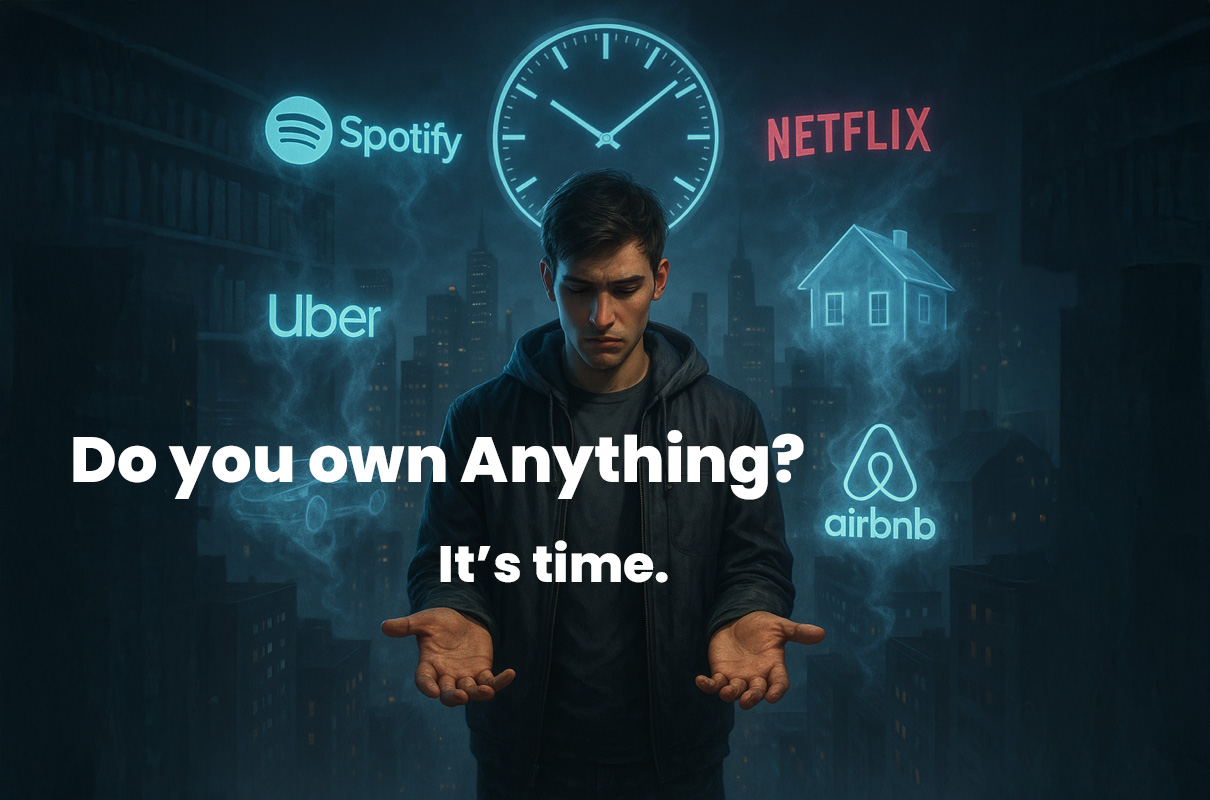Our parents owned houses. We rent subscriptions. But the next generation will own tokens — and those tokens will represent castles, land, and culture.
Think about that for a moment. Ownership was once the great symbol of success. A home. A car. A library of books. A collection of vinyl records. These were not just possessions. They were milestones. Proof that you had arrived, that you had built something, that the future was yours to hold.
But what do most young people own today? Not much. Music is rented through Spotify. Films are rented through Netflix. Cars are borrowed through Uber. Homes are temporary, found on Airbnb. Even knowledge is rented — through online subscriptions, monthly fees, paywalls that disappear as soon as you stop paying.
We live in a generation that has more access than ever before… and less ownership than ever before. We can use almost anything, but we can truly claim almost nothing.
It feels convenient. Until you realise how fragile it is. Stop paying, and everything vanishes. The songs, the films, the data, the home, the car, the tools. All gone in an instant. Access without ownership is freedom without roots.
And yet, deep inside, people still crave something more permanent. Something they can point to and say: this is mine. Something that cannot be taken away by a corporate subscription model. Something that is part of them — and will be part of their children, too.
That craving is what will make the ownership revolution unstoppable.
The Vanishing Point of Ownership
You can see it in the numbers. The price of housing in many countries has climbed so high that entire generations have given up on owning a home. Wages stagnate. Debt piles up. The dream of property slips further and further away.
And when the big dreams vanish, people settle for small substitutes. Instead of a shelf of books, they keep a Kindle subscription. Instead of a car, they rent rides. Instead of a studio filled with music equipment, they lease plugins in the cloud.
It is practical. It is flexible. It is also hollow.
Because when everything is borrowed, nothing belongs to you. And if nothing belongs to you, how do you build wealth? How do you leave a legacy? How do you claim your place in the world?
This is why tokenisation is more than a financial trend. It is a generational answer to a crisis of ownership.
The Return of Belonging
Tokenisation flips the story. Suddenly, the things that were once out of reach — real estate, art, vineyards, cultural landmarks — can be divided into digital tokens and shared by thousands.
You no longer need to be a millionaire to own a piece of a castle. You no longer need to inherit a fortune to hold part of a vineyard. You no longer need to be chosen by an elite board to invest in a university.
You can step into ownership with a wallet, a few tokens, and the belief that shared value is stronger than borrowed access.
This is not theory. It is already happening.
And when people realise they can own part of a living, breathing cultural asset instead of just paying for another subscription, the shift will be as dramatic as the move from landlines to smartphones. Ownership will stop being a privilege. It will become a right.
The Emotional Dividend
Here is why this matters: ownership changes the way people feel.
When you own something, you care for it differently. You defend it. You talk about it. You invite others into it.
Nobody brags about their Netflix subscription. But people do brag about their homes, their art, their land. And when ownership becomes accessible through tokenisation, suddenly the pride of belonging spreads to millions who were locked out before.
This pride is not just emotional. It is financial. People hold longer. They invest deeper. They share more willingly. Because they are not just chasing a yield — they are defending a piece of themselves.
Why This Revolution Cannot Be Stopped
Every great shift in history begins the same way. A system becomes too rigid. Too unequal. Too closed. And then a tool appears that cracks it open.
Printing did that for knowledge. The internet did that for communication. Tokenisation is doing that for ownership.
It does not matter how much governments, banks, or old institutions resist. Once people understand that they can own a share of assets once locked away — and once they feel the pride of that ownership — they will not go back to renting everything.
Because ownership is not just about assets. It is about dignity.
A New Generation of Owners
This is why the next generation will not settle for being renters of culture, land, and history. They will not accept being locked out while a few institutions hoard the wealth. They will demand their share. And blockchain makes it possible to give it to them.

Imagine a world where your portfolio is not just stocks and bonds, but also a vineyard, a castle, a cultural landmark, a university, a solar farm. All fractionalised. All transparent. All liquid.
This is not a fantasy. This is the ownership revolution. And it is already in motion.
From Tokens to Legacy
When future generations look back, they will see this moment as the turning point. The moment when ownership was reclaimed. When people stopped being mere users and became stakeholders again. When the dream of belonging was taken from the few and given back to the many.
Tokens will not just be digital slips of paper. They will be keys. Keys to culture. Keys to land. Keys to history. Keys to the future.
And those who hold them will not just hold value. They will hold pride, meaning, and legacy.
Because ownership is not about what you use. It is about what you stand for.
Conclusion: From Renting to Belonging
Our parents owned houses. We rent subscriptions. But the next generation will own tokens — and those tokens will represent castles, land, and culture.
That is the essence of the ownership revolution. Not access. Not rental. Not fragile convenience that vanishes with a cancelled subscription. Real ownership. Shared, liquid, global.
It is bigger than finance. It is about dignity, pride, and belonging. It is about a generation reclaiming its right to own.
And when they do, they will not just own assets. They will own the future.




